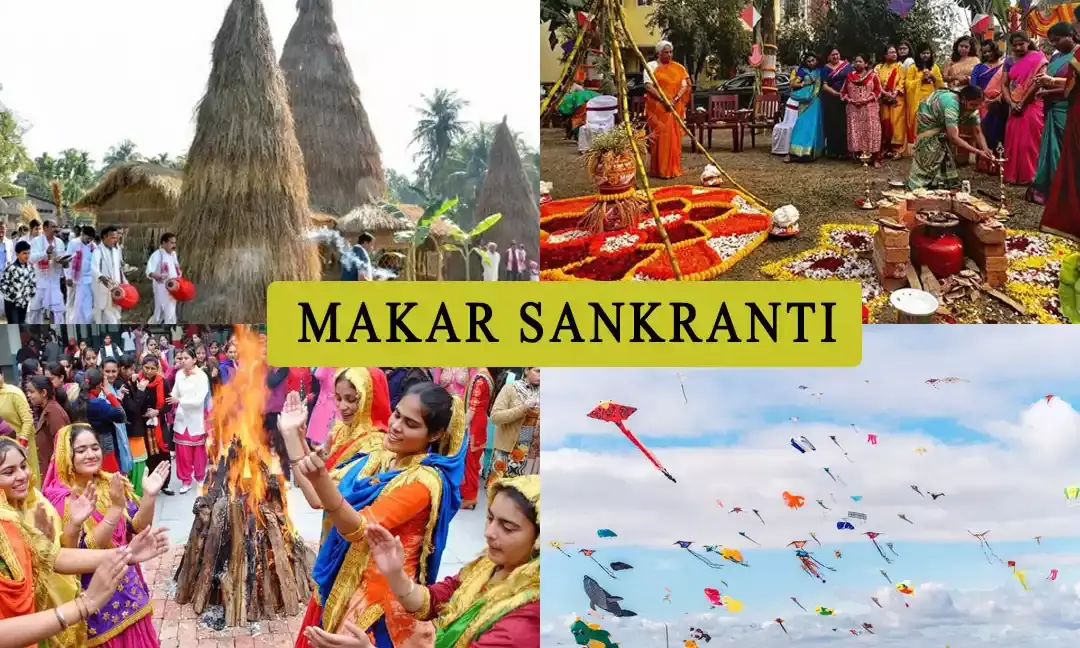Makar Sankranti: A festival celebrated across India by different names and traditions
Makar Sankranti is a wonderful confluence of nature, religious beliefs and cultural diversity. Know the various names of Makar Sankranti in different states.;

Every year Makar Sankranti is celebrated in many states of our country. Many different colors and forms of Makar Sankranti can be seen in every state. Unique customs and events are seen on this day in many states.
It is believed that Makar Sankranti marks the first day of the Sun's transit in Capricorn and the end of winter and the beginning of warm and long days. Makar Sankranti is the only Indian festival that is celebrated according to solar cycles, while most festivals follow the lunar cycle of the Hindu calendar. Therefore, it almost always falls on the same Gregorian date every year (January 14) and rarely changes the date by one or a day.
Makar Sankranti is considered a big festival in Hinduism because a lot of stories are associated with it. Donating, bathing in the Ganges River and eating Khichdi on this day have a different significance. The specialty of this festival is that it is known by different names all over India. Let us know the various names of Makar Sankranti celebrated across different states of India.
Assam - Magh Bihu
Magh Bihu, also known as Bhogali Bihu, is a major harvest festival celebrated in Assam, India. It marks the conclusion of the harvesting season in the month of Magha (January-February). It is the Sankranti festival in Assamese tradition, which is celebrated with week-long feasts. The first day of Magh Bihu is called ‘Uruka’. On this occasion, people make huts called "Meiji" out of bamboo, leaves and thatch, where they collectively feast. The next day in the morning, these huts are traditionally lit. During Magh Bihu, the people of Assam prepare rice cakes, which are known by different names, such as Shunga Pitha, Til Pitha, etc. Apart from this, sweets made of coconut are also made, which are called laru.
Tamil Nadu - Pongal
In Tamil Nadu, the Makae Sankranti is called Pongal, in which four-day events are held. The first day is celebrated as Bhogi-Pongal, the second day as Surya-Pongal, the third day as Mattu-Pongal and the fourth day as Kanya-Pongal. On such occasions, there is a custom of making rice dishes, rangoli and worshipping Lord Krishna.
Kerala - Vilakku
Makar Sankranti is celebrated as Makar Vilakku in Kerala. On this day, people especially visit the Makar Jyoti near the Sabarimala temple. The Sun God is worshipped.
Karnataka - Ellu Birodhu
Makar Sankranti is called 'Ellu Birodhu' in Karnataka. Many religious rituals are performed on this day. On this day, women here exchange Elu Bella i.e. fresh fruits, sugarcane, sesame, jaggery and coconut with about 10 families nearby.
Uttar Pradesh - Makar Sankranti and Khichdi
In North India, it is celebrated as Makar Sankranti and Khichdi. In some cities, Makar Sankranti is also called Khichdi. In North India, urad dal and rice khichdi is eaten on this day. Sesame, jaggery and peanuts are important on this day. After bathing, people make donations and then eat khichdi with ghee.
Punjab and Haryana - Maghi and Lohri
In Punjab and Haryana, Makar Sankranti is celebrated as Maghi or Lohri. Bathing in the river early in the morning on Maghi is of special importance. Hindus light lamps with sesame oil as it is believed to bring prosperity and remove all sins. A major fair is held at Sri Muktsar Sahib on Maghi which commemorates a historic event in Sikh history. Bhangra and Siddha are performed, after which everyone sits down and eats khichdi, jaggery and kheer. Lohri is celebrated the night before Sankranti or Maghi. Farmers start their financial year on the next day of Maghi.
Gujarat, Rajasthan and Madhya Pradesh - Uttarayan
Makar Sankranti is called Uttarayan in Gujarat, Rajasthan and Madhya Pradesh. A big festival is celebrated here on this day which lasts for 2 days. Uttarayan is on 14th January and Vasi-Uttarayan (Basi Uttarayan) is on 15th January. In Gujarat, people start enjoying Uttarayan from December till Makar Sankranti. Kite festival is celebrated here with great enthusiasm and Undhiyu and Chikki are special festival dishes on this day.
Kite flying is traditionally celebrated as a part of this festival, which is also very popular in Rajasthan and Madhya Pradesh. It is called Sankrant in Rajasthan and parts of Madhya Pradesh and women usually follow a ritual in which they give any kind of item (related to home, makeup or food) to 13 married women.
Uttarakhand - Ghughuti
This festival is celebrated very beautifully in Kumaon and Garhwal. While it is also called Ghughuti in Kumaon, it is called Khichdi Sankrant in Garhwal.
Ghughuti is made in Kumaon, which is a sweet. It is made in different shapes. It is a tradition to make it to welcome the Ghughuti bird. It is made from flour and jaggery and in Garhwali houses, Khichdi is made and donated.
This festival of Makar Sankranti is a wonderful symbol of India's diversity and cultural richness. The way of celebrating this festival is different in every state, but the spirit behind it is the same – respect for nature, celebration of collectivity and welcome new energy. This festival not only signifies the change in seasons but also brings the message of light, prosperity and unity into our lives. Makar Sankranti provides us with an opportunity to understand and cherish our traditions and values. On this auspicious occasion, let us spread the message of harmony and happiness in our society and strengthen our rich cultural heritage.

